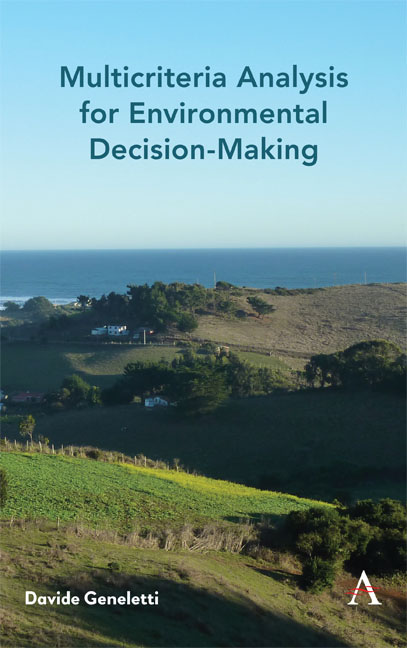Book contents
- Frontmatter
- Contents
- List of Figures
- List of Tables
- Acknowledgements
- List of Author and Contributors
- Introduction
- 1 Principles of Multicriteria Analysis
- 2 A Review of MCA Applications for Nature Conservation
- 3 Landfill Site Selection: Combining Spatial MCA with Stakeholder Analysis
- 4 Protected Area Zoning: Integrating Spatial MCA and Multi-objective Evaluation
- 5 Forest Landscape Restoration: Applying MCA to Design and Compare Options
- 6 Impact Assessment of Ski Areas: Combining GIS Indicators with MCA
- Conclusions
- Annex
- References
- Index
2 - A Review of MCA Applications for Nature Conservation
Published online by Cambridge University Press: 16 July 2019
- Frontmatter
- Contents
- List of Figures
- List of Tables
- Acknowledgements
- List of Author and Contributors
- Introduction
- 1 Principles of Multicriteria Analysis
- 2 A Review of MCA Applications for Nature Conservation
- 3 Landfill Site Selection: Combining Spatial MCA with Stakeholder Analysis
- 4 Protected Area Zoning: Integrating Spatial MCA and Multi-objective Evaluation
- 5 Forest Landscape Restoration: Applying MCA to Design and Compare Options
- 6 Impact Assessment of Ski Areas: Combining GIS Indicators with MCA
- Conclusions
- Annex
- References
- Index
Summary
Introduction
Decision-making in nature conservation increasingly requires comparing alternatives to achieve multiple and competing goals, such as promoting habitat conservation, while addressing the well-being of vulnerable communities (e.g. Zia et al. 2011; Zhang et al. 2013; Karlson et al. 2016). Alternatives include, for example, different locations and design for natural parks or restoration areas (Van Elegem et al. 2002; Uribe et al. 2014), options for plant species (Reubens et al. 2011) or wildlife management units (García-Marmolejo et al. 2008). For these reasons, MCA has been increasingly used in conservation to support the identification of the most suitable alternative(s), by integrating factual information coming from surveys or modelling, with value-based information collected through stakeholder engagement (e.g. Strager and Rosenberger 2006; Nordström et al. 2011). In order to be useful, MCA, and its integration with other methods and tools, need to be carefully designed and tailored to the specific context and decision-making process. In nature conservation, this has led to a variety of approaches and applications.
This chapter provides a structured review of empirical applications of MCA to nature conservation published in the scientific literature over the past 20 years. It adds to a more general review of MCA applications in environmental sciences carried out by Huang et al. (2011) and its follow-ups based on text mining by Cegan et al. (2017) and Kurth et al. (2017). The review has two objectives. First, to take stock of past experiences by investigating how key stages of the MCA process have been performed. Second, to compare these findings with best practices and common pitfalls identified in the MCA literature, in order to provide recommendations for successful applications in nature conservation, and more generally environmental decision-making.
The selection of MCA applications was conducted through keyword search in the Scopus database (www.scopus.com) limited to studies published between 1996 and 2016 that contain nature or biodiversity conservation and multicriteria analysis (or relevant acronyms and synonyms, including multicriteria decision analysis, evaluation, etc.) in the title, abstract or keyword. The search resulted in a total of 774 articles. After excluding review articles and non-relevant articles, the sample was reduced to 86 articles, which reported actual MCA applications in nature or biodiversity conservation. The list of selected articles is presented in the Annex.
- Type
- Chapter
- Information
- Multicriteria Analysis for Environmental Decision-Making , pp. 17 - 30Publisher: Anthem PressPrint publication year: 2019



